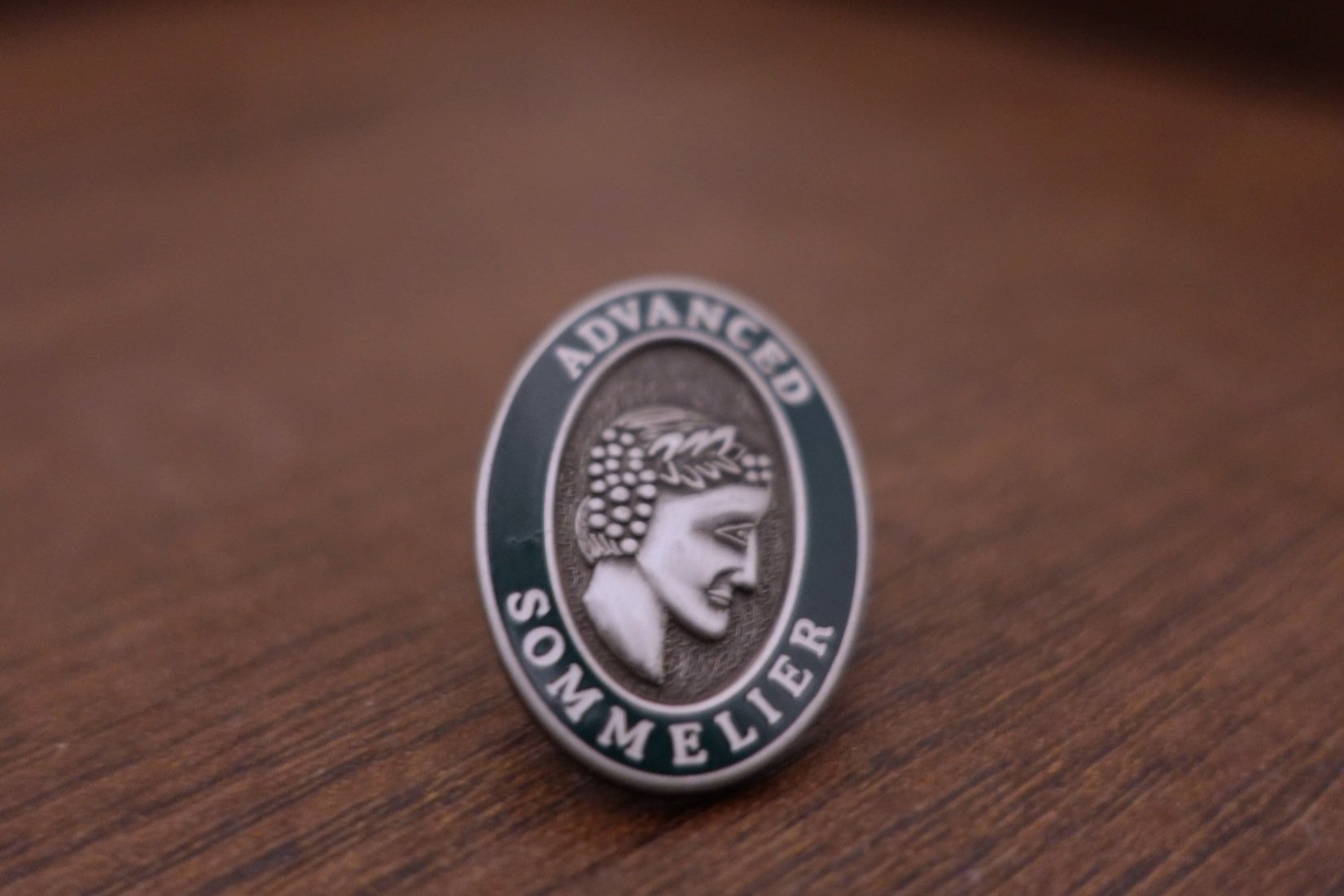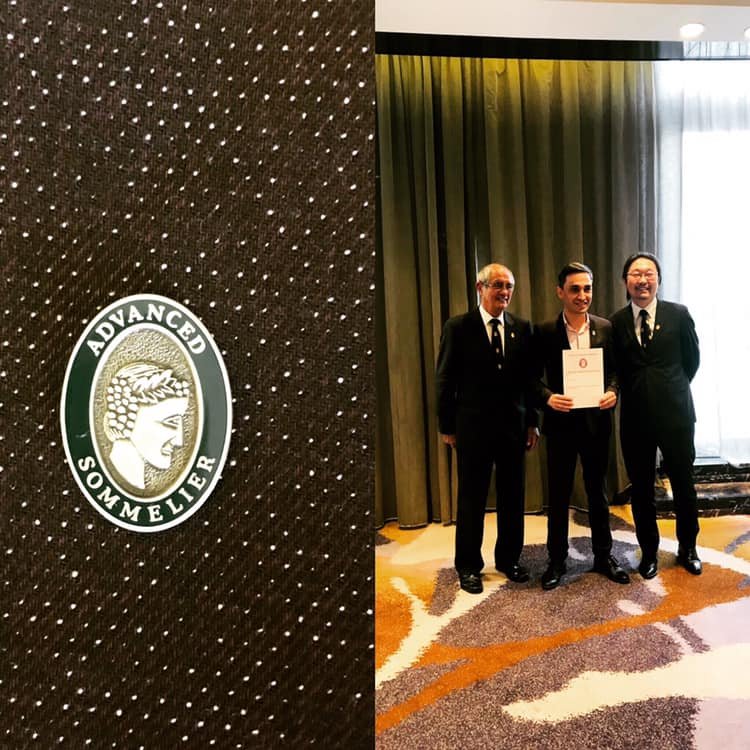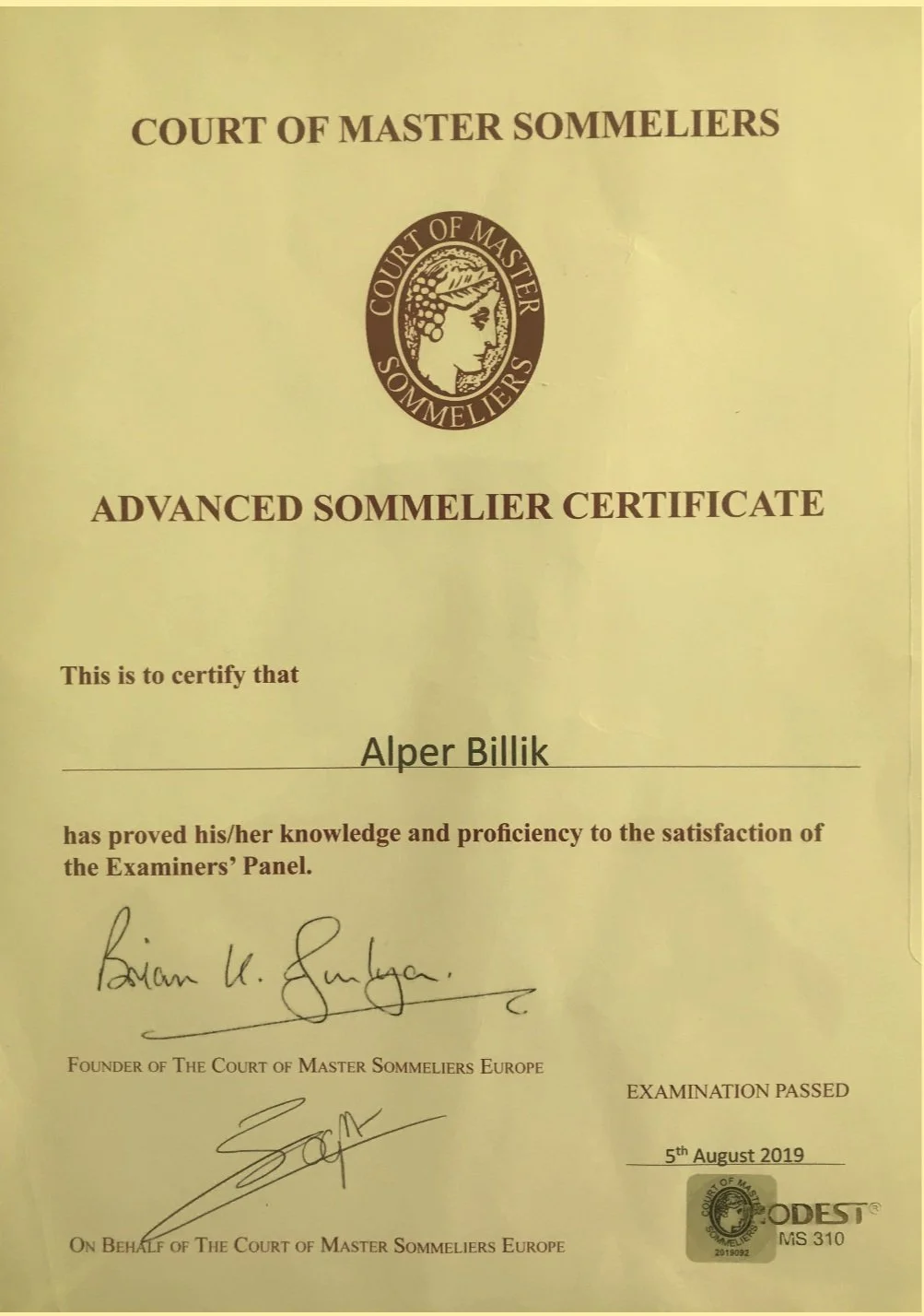How to Study for the Advanced Sommelier Exam and Pass It
The Advanced Sommelier Exam is one of the toughest challenges in the wine world. If you’re preparing for it, you already know it’s not just about wine knowledge—it’s about discipline, strategy, and staying calm under pressure.
I’ve been through it myself. I passed the exam, and I know how overwhelming it can feel. That’s why I want to share what worked for me—what to focus on, how to structure your study time, and the key mistakes to avoid.
In this guide, I’ll break down the theory, blind tasting, and service sections with real tips from my own experience. If you’re serious about passing, let’s get started.
Steps to Qualify for the Advanced Sommelier Exam
2019 Hong Kong
Before you can sit for the Advanced Sommelier Exam, you must meet the following requirements:
Certified Sommelier Certification:
You must hold the Certified Sommelier designation, which includes passing a theory, tasting, and service exam at an intermediate level.Advanced Sommelier Course:
Attend the Advanced Sommelier Course, a three-day intensive program that provides an overview of the exam and advanced-level content.Invitation to the Exam:
Invitations are extended based on your performance in the Certified Sommelier Exam and your readiness as assessed by the CMS. This is a competitive process, so demonstrating your commitment and preparation is essential.
Structure of the Advanced Sommelier Exam
1. Theory Exam
Duration: 60 minutes
Format: Approximately 90 questions, including multiple-choice, short-answer, matching, map identification, and label recognition.
Focus Areas:
Wine Regions: Advanced knowledge of regions like Burgundy, Bordeaux, Champagne, Germany, Italy, Spain, Austria, and the New World.
Producers and Classifications: Know top producers, vineyard sites, and classification systems (e.g., 1855 Bordeaux Classification, VDP in Germany).
Fortified Wines and Spirits: Study Sherry, Port, Madeira, Vermouth, and spirits like Cognac, Armagnac, and Rum.
Viticulture and Vinification: Understand soil types, vine diseases, pruning methods, and winemaking techniques like reverse osmosis and biodynamic practices.
Advanced Terminology: Be familiar with terms like "sur lattes," "liqueur de tirage," and "sous tirage" in Champagne or "vin jaune" in Jura.
Vintage Knowledge: Memorize key vintages for major regions over the last 30 years.
Maps and Labels: Be able to identify wine regions on maps and recognize wine labels from iconic producers.
Tasting Exam:
The Tasting Exam of the Advanced Sommelier certification is not about basic wine identification or beginner-level knowledge. At this stage, candidates are expected to demonstrate precision, advanced deductive reasoning, and a deep understanding of wine styles, regions, and quality levels. The focus is on accuracy, articulation, and logical conclusions under strict time constraints.
Below is a detailed guide on what to focus on and the requirements to excel in this section.
Exam Requirements
Number of Wines: Six (a mix of white and red wines).
Time Limit: 25 minutes (approximately 4 minutes per wine).
Objective: Provide a concise and accurate conclusion for each wine, including:
Grape Variety
Region of Origin
Vintage
Quality Level
You must use the CMS Deductive Tasting Method to systematically analyze each wine and provide a logical conclusion based on the evidence. The examiners are looking for clarity, confidence, and consistency in your analysis.
Key Focus Areas for Advanced-Level Preparation
1. Precision in Regional Typicity
At the Advanced level, it’s not enough to identify a wine as "Chardonnay" or "Cabernet Sauvignon." You must pinpoint regional typicity and sub-regional nuances.
Focus on Benchmark Regions:
Be able to distinguish between Chablis and Côte de Beaune Chardonnay based on minerality, oak influence, and acidity.
Differentiate Mosel Riesling from Alsace Riesling by alcohol level, residual sugar, and aromatic intensity.
Identify Left Bank Bordeaux (Cabernet Sauvignon-dominant) versus Right Bank Bordeaux (Merlot-dominant) by structure, fruit profile, and tannin integration.
Sub-Regional Markers:
Within Burgundy, recognize the differences between Meursault (richer, nuttier) and Puligny-Montrachet (more linear, citrus-driven).
In Barolo, distinguish between La Morra (softer, more floral) and Serralunga d’Alba (more structured, tannic).
What to Focus On:
Study benchmark wines from classic regions and sub-regions.
Understand how terroir (soil, climate, aspect) influences wine style and structure.
Be prepared to articulate why a wine fits a specific region or sub-region.
2. Structural and Aromatic Markers
The examiners expect you to rely on structure (acidity, tannins, alcohol, body) and aromatic precision to differentiate between similar wines.
Acidity:
High acidity is a hallmark of cool-climate wines like Mosel Riesling, Chablis, and Sancerre.
Moderate acidity may indicate warmer regions like Napa Valley or Southern Rhône.
Tannins:
Fine-grained tannins suggest Nebbiolo or Pinot Noir.
Firm, structured tannins point to Cabernet Sauvignon or Syrah.
Alcohol:
Low alcohol (<12%): Mosel Riesling, Vinho Verde.
Moderate alcohol (12-14%): Sancerre, Chianti Classico.
High alcohol (>14%): Amarone, Napa Valley Cabernet Sauvignon.
Aromatics:
Primary aromas (fruit, floral, herbal) should align with the grape variety and region.
Secondary aromas (oak, lees, malolactic) reveal winemaking techniques.
Tertiary aromas (leather, dried fruit, petrol) indicate age and quality.
What to Focus On:
Practice identifying structural markers (acidity, tannins, alcohol) and how they align with grape variety and region.
Refine your ability to detect aromatic subtleties, such as the difference between the floral notes of Nebbiolo (rose, violet) and Pinot Noir (red cherry, earth).
3. Vintage Assessment
Vintage plays a significant role in wine style and quality. At the Advanced level, you must demonstrate an understanding of how vintage conditions impact the wine in the glass.
Cool Vintages:
Higher acidity, leaner fruit, and longer aging potential. Examples: 2014 Burgundy, 2010 Bordeaux.
Wines may show more restraint and require time to open up.
Warm Vintages:
Riper fruit, higher alcohol, and softer acidity. Examples: 2015 Rhône, 2012 Napa Valley.
Wines are often more approachable in their youth.
What to Focus On:
Study vintage charts for key regions and understand how weather conditions (e.g., frost, heatwaves) impact wine style.
Be prepared to explain why a wine fits a specific vintage profile.
4. Quality Level and Winemaking Techniques
At the Advanced level, you must assess the wine’s quality level based on balance, complexity, and finish.
Balance: Does the wine’s acidity, tannins, alcohol, and fruit intensity work harmoniously?
Complexity: Are there multiple layers of flavor (primary, secondary, tertiary)?
Finish: Does the wine have a long, persistent finish, indicating high quality?
Winemaking Techniques:
Oak Influence: Vanilla, toast, and spice notes in wines like Napa Chardonnay or Rioja Reserva.
Lees Aging: Brioche and yeast notes in Champagne or Muscadet Sur Lie.
Malolactic Fermentation: Creamy texture and buttery notes in California Chardonnay.
What to Focus On:
Practice assessing balance, complexity, and finish in wines from all major regions.
Understand how winemaking techniques (e.g., oak aging, lees contact) influence the wine’s style and quality.
5. Time Management and Articulation
The ability to analyze and articulate your findings within the 25-minute time limit is critical.
Time Management:
Allocate approximately 4 minutes per wine.
Avoid overanalyzing; focus on the key markers that lead to a logical conclusion.
Articulation:
Use precise, professional language to describe the wine’s structure and aromatics.
Be confident and concise in your conclusions.
What to Focus On:
Practice timed tastings to ensure you can analyze each wine within 4 minutes.
Work on articulating your findings clearly and logically, using the CMS Deductive Tasting Grid as a guide.
Common Pitfalls to Avoid
Overthinking: Stick to the evidence in the glass and avoid second-guessing yourself.
Ignoring Structure: Pay close attention to acidity, tannins, alcohol, and body, as these are key to identifying grape variety and region.
Lack of Practice: Regular tasting is essential to build confidence and accuracy.
By focusing on these advanced-level requirements and honing your tasting skills, you’ll be well-prepared to tackle the Tasting Exam with confidence.
Service Exam:
The Service Exam is a critical component of the Advanced Sommelier Exam, designed to test your ability to provide exceptional hospitality, technical precision, and in-depth wine knowledge under pressure.
This section simulates real-world restaurant scenarios, where you must demonstrate your expertise in wine service, food and wine pairing, and handling challenging guest interactions. Below is a detailed breakdown of what to expect, the time limits, and how to prepare for this demanding section.
Exam Format and Time Limits
Duration: Approximately 45 minutes per candidate.
Scenarios: You will be placed in a simulated fine-dining environment with examiners acting as guests.
Focus Areas:
Champagne Service
Decanting Service
Food and Wine Pairing
Upselling and Guest Interaction
Handling Difficult Situations
What You Will Be Tested On
1. Champagne Service
Time Limit: 5-7 minutes.
Scenario: You will be asked to open and serve a bottle of Champagne or sparkling wine for a table of guests.
Key Requirements:
Present the bottle correctly, ensuring the label is visible to the guest who ordered it.
Open the bottle silently and with precision, avoiding any spillage or loud popping sounds.
Pour evenly for all guests, starting with the host, and ensure the glasses are filled to the appropriate level (approximately 1/3 full).
Answer questions about the Champagne, such as:
Dosage levels (e.g., Brut Nature, Extra Brut, Brut).
Grape varieties used (e.g., Chardonnay, Pinot Noir, Meunier).
Producer details and vineyard origins (e.g., Grand Cru villages).
Example Question:
"What is the difference between Brut Nature and Extra Brut?"
"Can you tell me about the producer of this Champagne and the vineyard it comes from?"
2. Decanting Service
Time Limit: 5-7 minutes.
Scenario: You will be asked to decant a bottle of red wine, often an older vintage or a wine with sediment.
Key Requirements:
Present the bottle to the host and confirm the order.
Use a decanting basket (if provided) to minimize disturbance of sediment.
Cut the foil cleanly below the lip of the bottle.
Wipe the neck of the bottle after removing the cork.
Decant the wine carefully, using a candle or light source to monitor sediment.
Pour a small taste for the host and then serve the rest of the table.
Answer questions about the wine, such as:
Vintage characteristics.
Producer history and winemaking style.
Ideal food pairings.
Example Question:
"Why is it important to decant this wine?"
"Can you tell me about the producer and the significance of this vintage?"
3. Food and Wine Pairing
Time Limit: Integrated into the overall service scenario.
Scenario: You will be presented with a menu and asked to recommend wine pairings for specific dishes. The dishes may include complex, Michelin-level cuisine.
Key Requirements:
Understand the flavor profiles, textures, and cooking techniques of the dishes.
Recommend wines that complement the dish’s flavors and structure.
Provide reasoning for your pairing choices, focusing on acidity, tannins, sweetness, and body.
Be prepared to suggest alternative pairings for guests with specific preferences (e.g., vegetarian options or non-alcoholic pairings).
Example Menu and Pairing Questions:
Starter: Scallop Carpaccio with Yuzu Gel and Caviar.
Recommended Pairing: Blanc de Blancs Champagne from Le Mesnil-sur-Oger (high acidity to cut through the richness, citrus notes to complement the yuzu).
Main Course: Slow-Cooked Wagyu Beef with Black Garlic Purée and Truffle Jus.
Recommended Pairing: Aged Barolo (Nebbiolo) for its high tannins, earthy truffle notes, and acidity to balance the richness of the beef.
Dessert: Lemon Verbena Panna Cotta with Raspberry Coulis.
Recommended Pairing: Moscato d’Asti for its light sweetness, low alcohol, and citrus-driven profile.
Example Question:
"Why did you choose this wine for the Wagyu beef?"
"What alternative pairing would you recommend for someone who prefers white wine?"
4. Upselling and Guest Interaction
Scenario: You will be asked to recommend premium wines or upsell a higher-tier bottle from the wine list.
Key Requirements:
Confidently explain the value of the premium wine (e.g., producer reputation, vineyard site, vintage quality).
Tailor your recommendation to the guest’s preferences and budget.
Avoid being pushy or overbearing.
Example Question:
"We’re celebrating a special occasion. Can you recommend a premium wine to pair with our meal?"
"What makes this wine worth the higher price?"
5. Handling Difficult Situations
Scenario: You may encounter challenging situations, such as:
A guest complaining about a corked wine.
A guest asking for a wine that is out of stock.
A guest with specific dietary restrictions or preferences.
Key Requirements:
Remain calm and professional.
Offer solutions, such as replacing the wine or suggesting an alternative.
Demonstrate empathy and a guest-first attitude.
Example Question:
"This wine tastes off. Can you explain what might be wrong with it?"
"I don’t drink red wine. Can you recommend a white wine that pairs well with steak?"
Advanced-Level Preparation Tips
Practice Timed Scenarios:
Simulate Champagne service and decanting with a stopwatch to ensure you stay within the time limits.Memorize Key Details:
Be prepared to discuss producers, vineyard sites, and vintage characteristics for wines you might serve.Study Food and Wine Pairing:
Focus on classic pairings as well as creative options for modern cuisine.Refine Your Hospitality Skills:
Practice maintaining a professional demeanor, even in high-pressure situations.Know Your Wine List:
If given a mock wine list, study it thoroughly and be ready to make recommendations based on guest preferences.
Common Pitfalls to Avoid
Rushing: Take your time to ensure precision, especially during Champagne service and decanting.
Overcomplicating Pairings: Keep your explanations clear and concise.
Lack of Confidence: Speak with authority and enthusiasm about your recommendations.
By focusing on these advanced-level requirements and practicing regularly, you’ll be well-prepared to excel in the Service Exam. Let SOMM DIGI AI assist you with interactive service scenarios, detailed producer profiles, and food pairing simulations to refine your skills further.
Business and Practical Aspects
The Advanced Sommelier Exam also tests your ability to apply business acumen in real-world scenarios. Here are some key areas to focus on:
Wine List Management:
Organize a wine list by region, style, or price.
Recommend wines that align with the restaurant’s concept and clientele.
Inventory Control:
Understand how to manage inventory turnover and minimize waste.
Be prepared to discuss strategies for pricing wines by the glass and bottle.
Event Planning:
Plan wine pairings for a banquet or corporate event.
Calculate quantities of wine needed based on guest count and preferences.
Upselling and Guest Experience:
Train staff to upsell premium wines without compromising service quality.
Create memorable guest experiences through thoughtful wine recommendations.
Tips for Success
Create a Study Schedule:
Dedicate time each day to theory, tasting, and service. Use flashcards, maps, and tasting grids to reinforce your knowledge.Join a Study Group:
Collaborate with other sommeliers to share resources and practice tasting and service scenarios.Use Advanced Study Tools:
Leverage technology like SOMM DIGI AI to access tailored study materials, practice questions, and interactive scenarios.Seek Mentorship:
Connect with Master Sommeliers for guidance and feedback on your preparation.Stay Calm Under Pressure:
Practice mindfulness techniques to manage stress during the exam.
Why SOMM DIGI AI is Your Ultimate Study Companion
Preparing for the Advanced Sommelier Exam can feel overwhelming, but SOMM DIGI AI is here to help. This cutting-edge AI tool is specifically designed to assist sommeliers in mastering the exam’s complexities.
Comprehensive Study Materials:
Access detailed notes on advanced wine regions, producers, and vintages.Interactive Practice Questions:
Test your knowledge with multiple-choice, short-answer, and map-based questions.Blind Tasting Simulations:
Practice identifying wines with AI-generated tasting notes and feedback.Service Scenarios:
Simulate real-world service challenges, from Champagne recommendations to food pairings.Personalized Feedback:
Receive tailored suggestions to improve your weak areas.
With SOMM DIGI AI, you’ll have the tools and confidence to excel in the Advanced Sommelier Exam.
Passing the Advanced Sommelier Exam requires dedication, discipline, and a strategic approach. By focusing on theory, tasting, service, and business acumen, and leveraging advanced tools like SOMM DIGI AI, you can achieve your goal of becoming an Advanced Sommelier.




